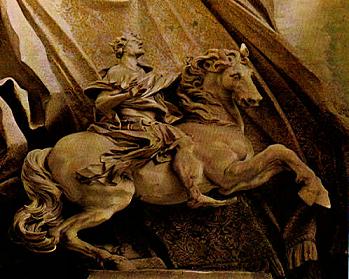Did Constantine Choose What Books Belong in the Bible for Political Purposes?

According to TDVC...
"The modern Bible was compiled and edited by men who possessed a political agenda ... to solidify their own power base." (Page 234)
"Constantine commissioned and financed a new Bible, which omitted those gospels that spoke of Christ's human traits and embellished those gospels that made Him godlike. The earlier gospels were outlawed, gathered up, and burned." (Page 234)
"The early Church needed to convince the world that the mortal prophet Jesus was a divine being. Therefore, any gospels that described earthly aspects of Jesus' life had to be omitted from the Bible." (Page 244)
TDVC - EXPOSED!!!
Such a view is nonsense! History is quite clear regarding the activities of Constantine, and one thing he had virtually nothing to do with was the canon of Scripture. The books of the Bible were accepted as divinely-inspired Scripture and circulated and read by the church long before the emperor Constantine.
A number of the New Testament books were recognized as belonging in the canon right there in New Testament times, far before Constantine was even born.
For the Scripture says,
"Do not muzzle the ox
while it is treading out the grain,"[a]
and "The worker deserves his wages."[b]
~ 1 Timothy 5:18 ~
[a] Deut. 25:4
[b] Luke 10:7
"Do not muzzle the ox
while it is treading out the grain,"[a]
and "The worker deserves his wages."[b]
~ 1 Timothy 5:18 ~
[a] Deut. 25:4
[b] Luke 10:7
In this verse, the apostle Paul joined an Old Testament reference and a New Testament reference and called them both (collectively) "Scripture" (Deuteronomy 25:4 and Luke 10:7). It would not have been unusual in the context of first-century Judaism for an Old Testament passage to be called "Scripture." But for a New Testament book to be called "Scripture" so soon after it was written says volumes about Paul's view of the authority of contemporary New Testament books.
More specifically, only 3 years had elapsed between the writing of Luke's Gospel and the writing of 1 Timothy (Luke was written around A.D. 60; 1 Timothy was written around A.D. 63). Yet, despite this, Paul (himself a Jew - a "Hebrew of Hebrews") does not hesitate to place Luke on the same level of authority as the Old Testament book of Deuteronomy.
Later, when the heretic Marcion emerged on the scene (who came up with his own false canon), it became necessary for the church to formally put in concrete a list of canonical books. When the church made this formal pronouncement, it simply affirmed the books that had already been accepted as canonical by the church at large.
It was like a final "stamp of approval".
The basic rules that guided recognition of the canon are as follows, listed in question format:
1. Was the book written or backed by a prophet or apostle of God?
This is the single most important test. The reasoning here is that the Word of God which is inspired by the Spirit of God for the people of God must be communicated through a man of God. Only a prophet of God will speak the Word of God.
I will raise up for them a prophet like you
from among their brothers;
I will put my words in his mouth,
and he will tell them everything I command him.
~ Deuteronomy 18:18 ~
from among their brothers;
I will put my words in his mouth,
and he will tell them everything I command him.
~ Deuteronomy 18:18 ~
Above all, you must understand that
no prophecy of Scripture came about
by the prophet's own interpretation.
For prophecy never had its origin
in the will of man,
but men spoke from God as they were
carried along by the Holy Spirit.
~ 2 Peter 1:20-21 ~
no prophecy of Scripture came about
by the prophet's own interpretation.
For prophecy never had its origin
in the will of man,
but men spoke from God as they were
carried along by the Holy Spirit.
~ 2 Peter 1:20-21 ~
In Galatians 1:1-24 the apostle Paul argued support for the Book of Galatians by appealing to the fact that he was an authorized messenger of God, an apostle.
2. Is the book authoritative?
In other words, can it be said of this book as it was said of Jesus, "The people were amazed at his teaching, because he taught them as one who had authority, not as the teachers of the law" (Mark 1:22). Put another way, does this book ring with the sense of, "Thus saith the Lord"?
3. Does the book tell the truth about God and doctrine as it is already known by previous revelation?
The Bereans searched the OT Scriptures to see whether Paul's teaching was true.
Now the Bereans were of more
noble character than the Thessalonians,
for they received the message
with great eagerness
and examined the Scriptures every day
to see if what Paul said was true.
~ Acts 17:11 ~
noble character than the Thessalonians,
for they received the message
with great eagerness
and examined the Scriptures every day
to see if what Paul said was true.
~ Acts 17:11 ~
They knew that if Paul's teaching did not accord with the Old Testament canon, it could not be of God. Agreement with all earlier revelation is essential (Gal. 1:8).
But even if we or an angel from heaven
should preach a gospel
other than the one we preached to you,
let him be eternally condemned!
~ Galatians 1:8 ~
should preach a gospel
other than the one we preached to you,
let him be eternally condemned!
~ Galatians 1:8 ~
4. Does the book give evidence of having the power of God?
Any writing that does not exhibit the transforming power of God in the lives of its readers could not have come from God.
For the word of God is living and active.
Sharper than any double-edged sword,
it penetrates even to dividing soul and spirit,
joints and marrow;
it judges the thoughts and attitudes of the heart.
~ Hebrews 4:12 ~
Sharper than any double-edged sword,
it penetrates even to dividing soul and spirit,
joints and marrow;
it judges the thoughts and attitudes of the heart.
~ Hebrews 4:12 ~
If the book in question did not have the power to change a life, then, the book could not have come from God.
5. Was the book accepted by the people of God?
In Old Testament times, Moses's scrolls were placed immediately into the Ark of the Covenant (Deuteronomy 31:24-26). Joshua's writings were added in the same fashion (Joshua 24:26). In the New Testament, Paul thanked the Thessalonians for receiving the apostle's message as the Word of God (1 Thessalonians 2:13). Paul's letters were circulated among the churches (Colossians 4: 16; 1 Thessalonians 5:27). It is the norm that God's people - that is, the majority of them and not simply a faction - will initially receive God's Word as such.
In the interest of accuracy, there were some books that were doubted for a time, but not for long. The books that were doubted for a time were Hebrews, James, 2 Peter, 2 and 3 John, Jude, and Revelation.
Hebrews was doubted because the author of the book was unknown. However, the book eventually came to be viewed as having apostolic authority, if not apostolic authorship.
James was doubted because of its apparent conflict with Paul's teaching about salvation by faith alone. The conflict was resolved by seeing the works James speaks of as an outgrowth of real faith.
2nd Peter was doubted because the style of this book differs from that of 1st Peter. It seems clear, however, that Peter used a scribe to write 1 Peter (see 1 Peter 5:12). So a style conflict is not really a problem.
2nd and 3rd John were doubted because the author of these books is called "elder," not "apostle." However, Peter (an apostle) is also called "elder" in 1 Peter 5:1. So it seems clear that the same person can be both an elder and an apostle.
Jude was doubted because it refers to two noncanonical books - the Book of Enoch and the Assumption of Moses. This objection was eventually overcome because even Paul quoted from pagan poets (see Acts 17:28 and Titus 1:12). Moreover, Jude enjoyed early acceptance by most of the early believers.
The Book of Revelation was doubted because it teaches a thousand-year reign of Christ. Since there was a local contemporary cult that taught the same, it was reasoned that Revelation must not be true Scripture. However, because many of the earliest church fathers believed in a thousand-year reign of Christ too, this objection was eventually seen as being without merit.
One thing is certain. The biblical canon was firmly established long before Constantine's time. Hence, Dan Brown's Da Vinci Code is woefully inaccurate on this issue.
(For more info, click here.)



0 Comments:
Post a Comment
<< Home